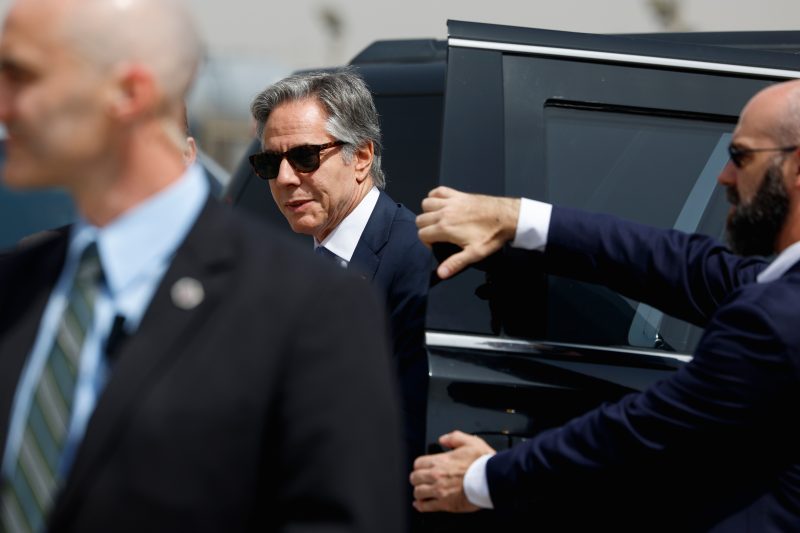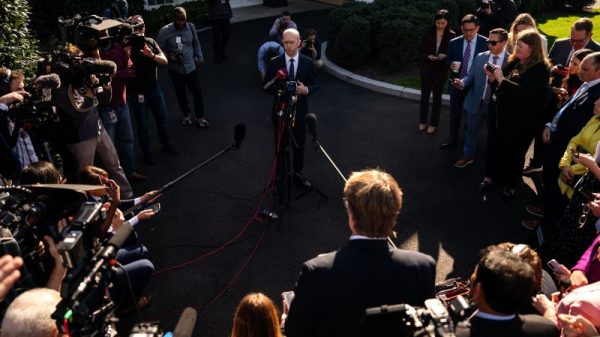The deadly explosion of pagers and walkie-talkies across Lebanon this week dealt another blow to President Joe Biden’s beleaguered efforts to reduce tensions in the Middle East, even as his top diplomats were present in the region reciting calls for calm.
The absence of a full-blown war between Israel and Hezbollah has been touted by U.S. officials as a core achievement of the past 11 months amid failures to broker a cease-fire between Israel and Hamas, and halt the enormous civilian death toll and restrictions on humanitarian aid in the war-ravaged Gaza Strip.
But with Israel moving forces north and flying warplanes over Beirut, Hezbollah calling Israel’s apparent sabotage of electronic devices an “act of war,” and rockets and missiles flying in both directions, Washington’s grip on the crisis appears more tenuous than ever.
The detonation of the communications devices on Tuesday and Wednesday killed at least 37 people in Lebanon, including Hezbollah operatives, children and health-care workers, and coincided with U.S. Secretary of State Antony Blinken’s trip to Egypt, where he urged “all parties” to avoid any steps that could “further escalate the conflict that we’re trying to resolve.”
Washington’s effort to urge de-escalation has been met with increasingly brazen assaults by its ally Israel and deadly rocket and missile volleys by Iranian-backed Hezbollah and Houthi militants — all of which threaten ongoing efforts to forge a deal to pause the fighting in Gaza and secure the release of hostages taken from Israel a year ago.
“Secretaries of state should travel to the region in a crisis, but the risk you run is eventually becoming part of the political furniture: You get taken for granted,” said Aaron David Miller, a Middle East expert who has advised both Republican and Democratic administrations. “Unless you husband your currency, the Israelis, the Palestinians, the Arab states look at American officials as part of the furniture. They get used to them.”
U.S. diplomats hold little sway over Iran and Hezbollah but wield significant leverage over Israel, the single largest cumulative recipient of American foreign aid. But U.S. officials argue that it is Washington’s unyielding support for Israel that has prevented a full-scale assault on the Jewish state by Iran and its proxy forces amid Prime Minister Benjamin Netanyahu’s controversial military campaign in Gaza.
“So far, we have been successful in keeping it from turning into an all-out regional war, and that’s what we’re going to continue to try to pursue,” State Department spokesman Matthew Miller said Thursday.
Some critics say the Biden administration’s logic is backward. “Promising Netanyahu arms and protection whether or not he de-escalates has, unsurprisingly, not persuaded him to de-escalate,” said Harrison Mann, a former analyst for the Defense Intelligence Agency who resigned from the military earlier this year in protest of U.S. policy toward Israel. “Hopefully it’s at least racked up frequent-flier points for the envoy and his team.”
Matthew Miller said no conclusions should be drawn from the frequent travel of U.S. officials to the region and Israeli escalations.
“There are various escalations that happen in this conflict — not on a daily basis, but a pretty regular basis — and there are U.S. officials traveling on a pretty regular basis,” he said. “In college, I was taught correlation is not causation.”
At the crux of the conflict is Israel’s ongoing military campaign in Gaza following Hamas’s Oct. 7 cross-border assault, which killed more than 1,200 people and resulted in the taking of more than 240 hostages. Israel’s ensuing military campaign has killed more than 40,000 Palestinians, according to local health authorities, and brought about famine and polio in parts of the enclave.
In solidarity with Hamas, Hezbollah began firing rockets at Israel on Oct. 8, resulting in routine exchanges of fire between the Lebanese militant group and Israel — and the displacement of tens of thousands of people on both sides of the Israel-Lebanon border.
On Thursday, Hezbollah leader Hasan Nasrallah said his group would not stop until Israel ended the war in Gaza. He added that detonating explosives in civilian areas — including supermarkets, houses and crowded streets — was a “crime.”
Israeli authorities, who rarely discuss operations in other countries, have declined to comment on whether Israel was responsible. U.S. officials have acknowledged that Israel was behind the attack but insist that the Israelis did not inform the United States about its specifics beforehand, only afterward using intelligence channels.
The Israeli government has come under intense pressure to create conditions that would allow displaced Israelis to return safely to their homes, and Israeli Defense Minister Yoav Gallant on Thursday said the military had entered “a new phase of the war” focused on its northern border.
Some former officials surmised that the exploitation of the communications devices was designed to paralyze Hezbollah communications in the event of an imminent full-scale war — a path Israel has not yet taken.
“My best guess is the potential exposure of the devices by Hezbollah made Israel trigger the attack before they really wanted to,” said Frank Lowenstein, a Middle East adviser to former secretary of state John F. Kerry.
An alternative theory, Aaron David Miller said, is that Hezbollah had not discovered the plot but Netanyahu “approved the operation to boost his own political fortunes.”
Sen. Chris Van Hollen (D-Md.) said Netanyahu’s actions should not be tolerated. “Time and again, Prime Minister Netanyahu has ignored the Biden Administration’s concerns, taking escalatory action without even conferring with the U.S.,” he said in a statement. “He’s repeatedly demonstrated that his priorities lie in his own political self-interest — not in that of his people, who are calling for a ceasefire and a return of the hostages.”
Whatever transpired, U.S. officials have maintained that they were not told about the operation ahead of time and played no role in it.
“We were not involved in [Tuesday’s] incidents or [Wednesday’s] in any way. And I don’t have anything more to share,” White House spokesman John Kirby told reporters this week. Kirby insisted that U.S. officials continue to believe there is a “diplomatic path forward” to a cease-fire in Gaza and a truce between Hezbollah and Israel.
“We want to see the war end. And everything we’ve been doing since the beginning has been designed to prevent the conflict from escalating,” he said.
But talks between Israel and Hamas have been deadlocked for weeks over Israeli demands for a continued military presence along the Egypt-Gaza border and Hamas demands over the ratio of Palestinian prisoners to be released in exchange for the hostages.
Several weeks ago, U.S. officials said they planned to present a “take it or leave it” proposal to Israel and Hamas that if the two sides fail to accept would mark the end of the American-led negotiations.
That proposal hasn’t been made, said Aaron David Miller, the Middle East expert, because U.S. officials fear that if rejected, it would unleash the “bigger strategic nightmare” of an all-out war.
“Despite the odds of not succeeding,” he said, “keeping this going is critically important.”
Claire Parker in Cairo, Missy Ryan and Abigail Hauslohner contributed to this report.





























